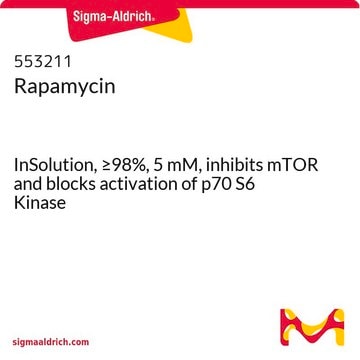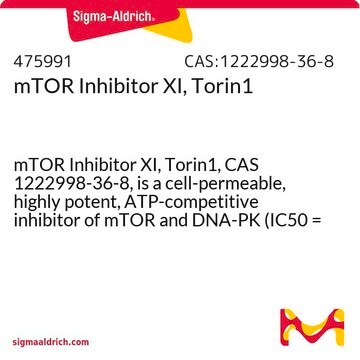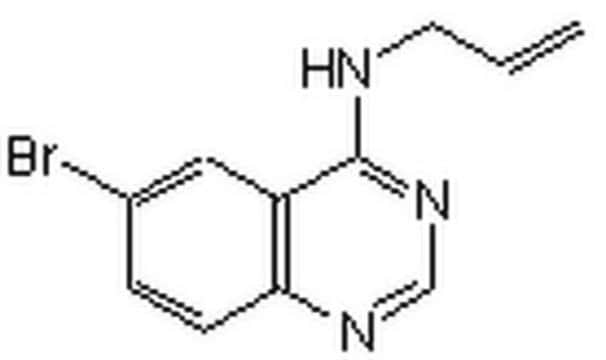R8781
Rapamycin
from Streptomyces hygroscopicus, ≥95% (HPLC), solution, mTOR inhibitor
Synonym(s):
23,27-Epoxy-3H-pyrido[2,1-c][1,4]oxaazacyclohentriacontine solution
About This Item
Recommended Products
product name
Rapamycin, Ready Made Solution, 2.5 mg/mL in DMSO (2.74 mM), from Streptomyces hygroscopicus
biological source
Streptomyces hygroscopicus
Quality Level
vapor pressure
0.56 hPa ( 20 °C)
Assay
≥95% (HPLC)
form
solution
autoignition temp.
301 °C
concentration
2.5 mg/mL in DMSO (2.74 mM)
color
colorless to yellow
antibiotic activity spectrum
fungi
yeast
Mode of action
enzyme | inhibits
storage temp.
−20°C
Related Categories
General description
Application
- as a supplement in mTeSR1 medium to culture induced pluripotent stem cell (iPSC) colonies for induction of autophagy signaling
- to treat the Drosophila S2 cells at 65-70% confluence,
- to measure protein synthesis
- to stimulate autophagy in ovarian cancer cells
Packaging
Other Notes
Rapamycin has been expertly reviewed and recommended by the Chemical Probes Portal. For more information, please visit the Rapamycin probe summary on the Chemical Probes Portal website.
Storage Class Code
10 - Combustible liquids
WGK
WGK 1
Flash Point(F)
188.6 °F - closed cup
Flash Point(C)
87 °C - closed cup
Personal Protective Equipment
Certificates of Analysis (COA)
Search for Certificates of Analysis (COA) by entering the products Lot/Batch Number. Lot and Batch Numbers can be found on a product’s label following the words ‘Lot’ or ‘Batch’.
Already Own This Product?
Find documentation for the products that you have recently purchased in the Document Library.
Customers Also Viewed
Articles
Bioactive small molecules for immune system signaling target identification/validation and antibiotics, antivirals, and antifungals offered.
Bioactive small molecules for immune system signaling target identification/validation and antibiotics, antivirals, and antifungals offered.
Bioactive small molecules for immune system signaling target identification/validation and antibiotics, antivirals, and antifungals offered.
Bioactive small molecules for immune system signaling target identification/validation and antibiotics, antivirals, and antifungals offered.
Our team of scientists has experience in all areas of research including Life Science, Material Science, Chemical Synthesis, Chromatography, Analytical and many others.
Contact Technical Service








